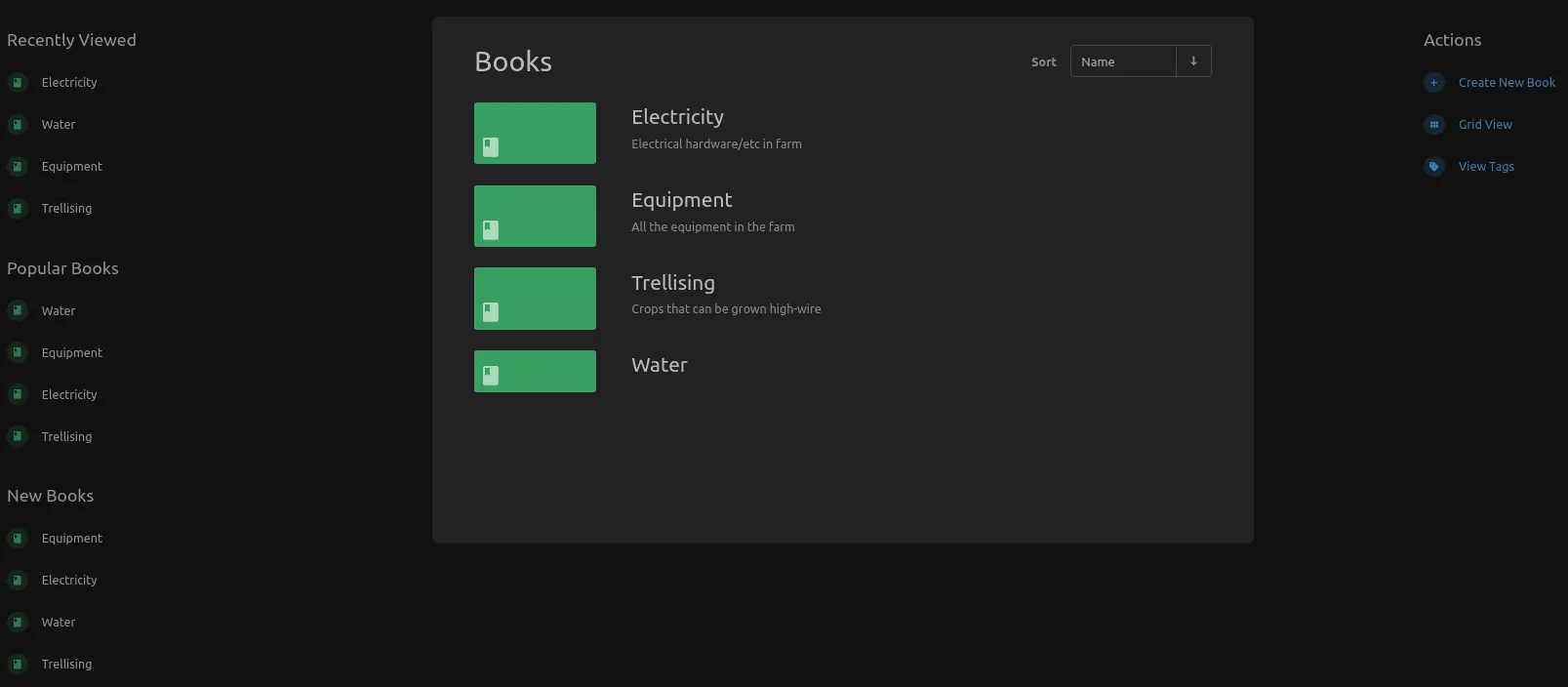I have a bookstack instance self-hosted and I quick like the program and workflow. I like having 'books' of information to separate/organize my information. It feels very much like folder heirarchy to me, and while that has its issues, I prefer it. Being able to add tags to pages helps alleviate some of those issues and helps with a broad search for an idea when I don't know where it is stored down the line. Here is a quick view of my bookstack. It's nothing fancy, but a visual to see what I'm talking about.

It’s great software. But I am very fond of software designed to be readable in 100 years. Meaning that the file does not require the program to be read. Text files (.txt, .rtf, .odt) are formats that are designed to be read in the future without MS Word, or Notepad; .doc, .docx, etc without microsoft might not be readable in 100 years without having MS software. That is why I like taking notes with markdown and why I like software like QownNotes, obsidian, and logsec which produce files that are readable without the program. So if they crash and burn, I don’t lose my data. With Bookstack, I cannot view that data without bookstack. And if I wanted to move my documents to a different software, I cannot export everything. I can export page-by-page but that’s only reasonble on a small scale. So, while I like the program, I would like to move to another program for my wiki/personal knowledge base.
For those wondering why I am worried about this: I've run into many walls with software problems in my life:
- software I use being abandoned
- new terms of service I don not agree with blocking me from using the program I like
- price hikes for software I use that are not worth it but I'm vendor locked and so I have to either pay or go the tedious route of moving my data slowly over because there is no export possibilities. 4)I am using a new device and I can't access or view my data because the software doesn't work on the device, hasn't been ported over, or isn't usable on the novel form factor of the device.
My worries with bookstack flow from there. It may be a good program, but what if my needs change, can I move my data easily?
In my search, Tiddlywiki was a standout in this view because it is a quine. It contains all its code to run/display itself (it’s a quine). So in 100 years, you should be able to open a tiddlywiki and it will contain be able to be read. However, I am having a hard time adapting to tiddlywiki’s way of doing things. Far less user friendly than Bookstack in ease of use. Thus I am writing this post to see if anyone else has ideas. Is there a way to make tiddlywiki look/work more like Bookstack in the book→pages (or folder→files) workflow? Or do you know of another piece of software for a knowledge base that meets the ideas above?
While Jellyfin does movies, music, and photos, it can also do books.
Despite its name, Bookstack isn't an ebook organizer or ebook organizing server software, it's more in line with a wiki or personal knowledge organizer software.
I inadvertently found myself coming across software you might sorta like @[email protected] in the form of Zettlr. It's FOSS, uses Markdown formatting, and is able to export to a variety of different formats.
Downsides are that there's currently no mobile app, nor plugin/extension support, so the base software is what you get. Nevertheless, it's a very fully featured piece of software from what I can tell and has pretty good documentation to help learn your way around it. Bonus as well is that it's cross-platform, so you can run it across different OSes on desktop.
Edit:
Also OP, if you're really fond of TiddlyWiki but want more guidance on making it more structured, you might look through these notes. TiddlyWiki is really cool, however it certainly takes some getting used to with its style.
Thank you for the suggestion. I'm taking notes on the suggestions everyone has put forward to try out in the future. But thanks to a comment by @[email protected], I realized I was thinking wrong in how I tried to use tiddlywiki. I was trying to get it to act like another program, which was more straightforward in workflow, but after sqaud's suggestion, I considered starting from a text file of my data and thinking about what I'd need on top of that to work. I've got some ideas now and it makes Tiddlywiki look less intimidating and confusing than prior. It won't make use of all the fancy features TW has, but it will work for me I think. And I can always go back and add fancy features later when I'm used to TW. Those notes you linked will definitely be useful so thank you.